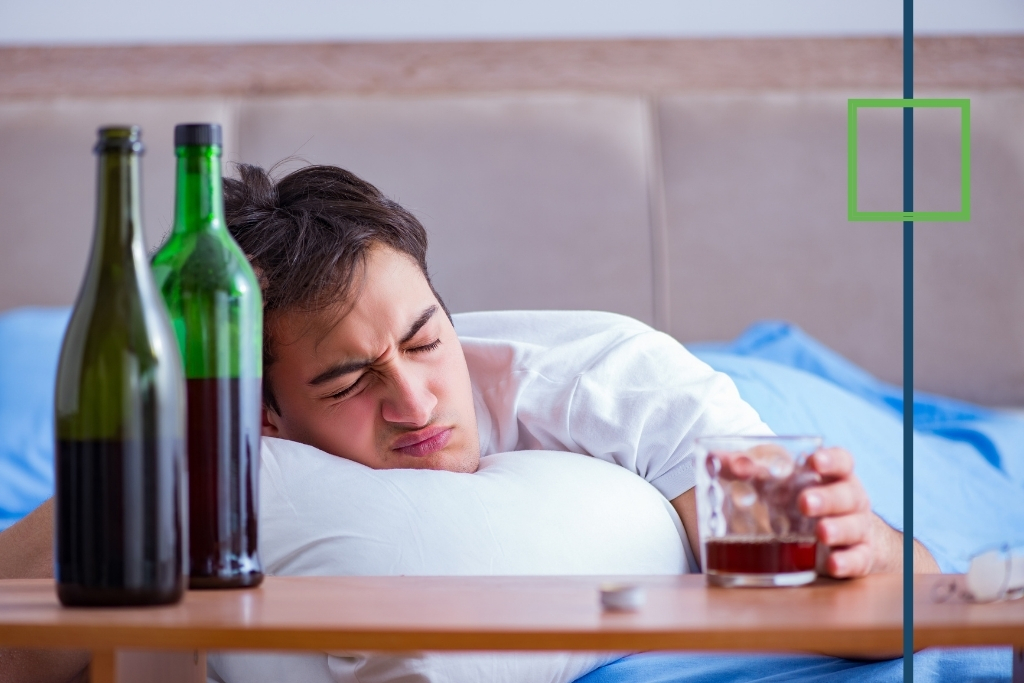Benefits of giving up alcohol
Approximately 17 million adults ages 18 and older have an alcohol use disorder (AUD) and 1 in 10 children live in a home with a parent who has a drinking problem. [1] Alcoholism occurs when you drink so much that your body eventually becomes dependent on or addicted to alcohol. With this alcohol dependence, you will continue to drink even when drinking causes negative consequences, like losing a job or destroying relationships with people you love. Therefore, we suggest that if your condition is severe, you may need to seek alcoholism treatment at an inpatient facility.
Alcoholism develops when you drink so much that chemical changes in the brain occur. Given that, these changes increase the pleasurable feelings you get when you drink alcohol. It will make you want to drink more often, even if it causes you harm. Eventually, the pleasurable feelings associated with alcohol use go away and the person with alcohol use disorder will engage in drinking again to prevent alcohol withdrawal symptoms. Furthermore, alcohol use disorder typically develops gradually over time. In addition, it is known to run in families. Below is the list of benefits you can achieve by giving up alcohol.
1. Giving up alcohol weight loss
Many diets that work fast to help people lose weight include ditching alcohol altogether.
At 7 calories per gram on average, alcohol contains almost twice the amount of calories found in carbohydrates. Unless you’re opting for low-calorie versions such as low-calorie wine or low-calorie beer.

2. Sleep Better
People can rapidly develop tolerance to the sedative effects of alcohol. Alcohol contributes to sleep deprivation and aids tiredness the day after a night of drinking. Thus explaining the side of exhaustion that normally accompanies a heavy hangover.
3. Lower Cancer Risks
According to Cancer Research UK [2], alcohol is responsible for around 4,400 breast cancer cases in the UK every year. It’s just one of 7 cancers that alcohol is linked to, including bowel cancer, liver cancer, mouth cancer, and three different types of throat cancer.
This is because alcohol can break down into a molecule called acetaldehyde, which causes mutations in our cells that can form cancerous tumors. With regards to breast cancer, it is suggested that alcohol increases women’s estrogen production, which may cause cancerous cells to multiply quicker.
4. Lower Your Blood Pressure
Not drinking alcohol is the key to a healthy heart. Especially when you note the long list of heart-related problems long-term drinking can cause.

Alcohol raises our blood pressure both temporarily and permanently. And excessive alcohol consumption over the years can lead to high blood pressure – one of the main causes of heart disease.
5. Clear Your Brain
Drinking ultimately interferes with the neurotransmitters that are responsible for our mental health. And has even been found to lower the levels of serotonin in our brain that help regulates our mood. Studies show that alcohol inhibits the functioning of the hippocampus – that’s the part of the brain responsible for creating and saving memories. So when you stop drinking alcohol, it will improve your memory and decrease mood swings.
6. Sex Life
Alcohol works by inhibiting parts of our central nervous system (CNS). So whilst it may give us that extra confidence boost after a glass or two, it also dulls the sensitivity of our nerve endings, which are important for sexual arousal and orgasm in both sexes.
7. Liver
Drinking more than 14 units a week for 10-20 years increases your risk of developing serious illnesses, including cancer, stroke, heart disease, liver and brain disease. Our liver bears the brunt of the work when it comes to breaking down alcohol. So it’s no real surprise that excessive drinking can lead to liver problems.
Professional medical healthcare warns of alcoholic cirrhosis, a very serious form of liver damage that leads to scar tissue which prevents it from working properly. It includes symptoms such as fatigue, nausea, yellow skin, and in extreme cases coughing up blood.
8. Heart
Not drinking alcohol is the key to a healthy heart. Especially when you note the long list of heart-related problems long-term drinking can cause. Alcohol raises our blood pressure both temporarily and permanently. And excessive alcohol consumption over the years can lead to high blood pressure – one of the main causes of heart disease. [3]
Benefits of giving up alcohol timeline
For anyone who suffers from addiction, just the thought of having to stop using can cause severe mental distress. But, with the help of a medical detox center, the medical detox process is managed. A comprehensive team prescribing medications can alleviate your alcohol withdrawal pains while monitoring your health 24 hours. Assuring both your safety and comfort.
Those suffering from addiction for long periods at high rates of use usually experience more severe withdrawal symptoms, making the process more difficult for them. The symptoms may seem to get worse through the detox process. They need constant care and attention to help manage the symptoms. Alcohol addiction treatment is within your reach to ensure your recovery starts on a comfortable and safe step.

Week one of giving up alcohol
After one week away from alcohol, you may notice that you are sleeping better. When you drink, you typically fall straight into a deep sleep, missing the important rapid eye movement (REM) sleep. While you are supposed to have between six and seven cycles of REM sleep a night, you typically only have one or two when you’ve been drinking.
You’ll also have more opportunities to manage your food and drink intake. Sleep helps to balance the hormones that make you feel hungry or full. After drinking, your ghrelin levels (the hormone that makes you feel hungry) go up and leptin (the hormones that make you feel full) go down.
Week two of giving up alcohol
After two weeks off alcohol, you will continue to reap the benefits of better sleep and hydration. As alcohol is an irritant to the stomach lining, after a fortnight you will also see a reduction in symptoms such as reflux where the stomach acid burns your throat.
Week three of giving up alcohol
Drinking too much alcohol can cause your blood pressure to rise over time. After 3-4 weeks of not drinking, your blood pressure will start to reduce. Reducing your blood pressure can be crucial as it can help to lessen the risk of health problems occurring in the future.
Week four of giving up alcohol
Giving up alcohol will have a positive impact on your skin due to you having better levels of hydration. As more water will have been absorbed rather than wasted, you are likely to have more hydrated-looking skin, as well as reduced dandruff and eczema.
Removing alcohol from your diet for four weeks can also help to improve your liver function as your liver will start to shed excess fat. If your liver function is not too badly affected by alcohol, it can recover within 4-8 weeks. [4]
Do you need help to stop drinking?
If you are an alcoholic, your very first step in recovery should be to medical alcohol detox in a safe and medically supervised setting. We Level Up FL Detox center medically assists patients to clear their systems of addictive substances, such as alcohol.
Symptoms of alcoholism are based on the behaviors and physical outcomes that occur as a result of alcohol addiction.
If you are an alcoholic, you may engage in the following behaviors:
- Drinking alone
- Making excuses to drink
- Neglecting personal hygiene
- Being unable to control alcohol intake
- Missing work or school because of drinking
- Drinking more to feel the effects of alcohol
- Becoming violent or angry when asked about their drinking habits
- Continuing to drink even when legal, social, or economic problems develop
- Giving up important social, occupational, or recreational activities because of alcohol use
You may also experience the following physical symptoms:
- Alcohol cravings
- Lapses in memory (blacking out) after a night of drinking
- Tremors (involuntary shaking) the morning after drinking
- Withdrawal symptoms when not drinking, including shaking, nausea, and vomiting
- Illnesses, such as alcoholic ketoacidosis (includes dehydration-type symptoms) or cirrhosis
At We Level Up FL, our thorough approach to rehabilitation supports several levels of care to ensure the best possible outcome for every patient who enters our doors. From an intensive and more supportive atmosphere for those in the early days of recovery to a comfortable residential-style living dynamic upon completion of detox, we are here to help guide you down the safe and results-based path to your sobriety.
Once detox is complete, a new doorway in treatment opens up, which is referred to as a residential level of care. Our residential care program slowly and effectively introduces the individual into an atmosphere of therapeutic growth, marked by master’s level therapists, clinicians, group counselors, psychiatrists, and a community of like-minded individuals with the same aim: to attain sobriety and live a great life.
If you or someone you love is seeking a safe, secure, and compassionate resource for alcoholism treatment, We Level Up FL is here to guide you in giving up alcohol. Call us and speak with an addiction counselor today about our levels of care.
Sources:
[1] Alcohol Use Disorder – National Institute on Alcohol Abuse and Alcoholism
[2] Does alcohol cause cancer? – https://www.cancerresearchuk.org/about-cancer/causes-of-cancer/alcohol-and-cancer/does-alcohol-cause-cancer?utm_source=affiliate_window&utm_medium=affiliate&utm_name=online_retail&utm_content=www.goodto.com&awc=2584_1642678749_e369d496e46a915d634c1612460bc9c9
[3] Benefits of not drinking alcohol: 16 amazing health benefits of ditching the booze – https://www.goodto.com/wellbeing/effects-of-alcohol-283521
[4] What are the benefits of giving up alcohol for a month? – https://www.priorygroup.com/blog/benefits-of-giving-up-alcohol-for-a-month
[5] We Level Up Treatment » Alcohol Detox